Episodes
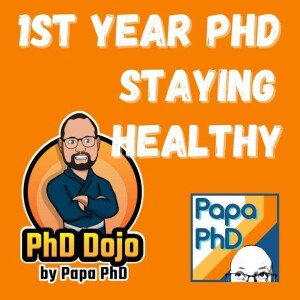
Monday Dec 06, 2021
Monday Dec 06, 2021
Welcome to the PhD Dojo!
This week, I'm bringing you part four of the PhD Dojo series on tools and strategies to make the best out of your PhD experience. Today – Staying Healthy Within and Without, what three habits you need to nurture to stay balanced during grad school.
Below, you'll find the full – edited to be read – transcript of the live taping of this episode.
VIDEO
https://youtu.be/x9pwypEsluQ?sub_confirmation=1
FULL TRANSCRIPT
Welcome to the third installment of the PhD Dojo series titled “1st Year PhD”, where I share my mistakes, and lessons learned during my PhD.
In the last episode, I talked about building a village around you, a network of people and resources to help you with the obstacles and difficulties that are sure to come during your PhD. A community to make your experience of the day-to-day as a researcher the best possible.
This week, I’m going to talk about the internal journey – I’m going to share three habits you need to develop to make sure your body and mind stay healthy throughout grad school.
And at the end, I will share one mental obstacle that I dealt with, especially during the first year of my PhD, that a lot of us go through, and that, in the extreme, can undermine your whole PhD experience and even your health – especially your mental health.
So, the first habit I’m going to share with you, besides eating well and hydrating, is to move – include sports in your routine, or the physical activity of your choice. For me, it was Aikido and intramural sports. And the benefit they brought me was twofold: physical fitness and a community, social interactions outside the lab. Put it on your schedule and don’t question it – in the end, you’ll see it was time well invested, not lost.
The second habit has to do with staying balanced within. For me, aikido also played a role in this aspect, but for you it can take different forms – yoga, meditation, journaling, knitting, climbing. The day-to-day of the PhD will put strain in your concentration and focus. You need to have a time in the day, or in the week, where you hit the reset button and become centered and balanced, and ready to tackle your research having dissipated any brain fog or fatigue.
On this point – I’d really love to know what is YOUR goto habit to hit that reset button and how often you do it! Share it in the comments section! I’m sure people will appreciate having new strategies to try!
The third habit that is key to a healthy and fulfilling PhD journey is keeping communication channels with friends, family, and mentors open at all times. This was a challenge for me, in part, because I was an international student. My advice is – put as much energy and intent into it as possible – and it’s so easy today – everyone has Zoom, WhatsApp, Facetime… What you must avoid at all costs is isolating yourself and cut off your mental and emotional safety net.
Now… I’m telling you all of this, because looking back, I see I could have done much better than I did.
And I told you I’d share an obstacle that a lot of us face, especially when starting your PhD – and this obstacle made me neglect these habits at the beginning of my PhD.
It was the impostor phenomenon – a persistent feeling that I wasn’t good enough, that I wasn’t as good as my peers, and even, at times, that I didn’t belong – that somehow a clerical error was made and I was mistakenly accepted into the PhD Program.
Well – I’m here to tell you two things:
First – the peers you’re comparing yourself with, there’s a high chance they’re having the exact same feelings. A lot of us experience the impostor phenomenon. There are probably workshops offered where you are about it and about how to defuse it. What I have to tell you today is – YOU applied for your program – YOU were accepted – YOU deserve to be where you are. There’s been no mistake. Now, it’s up to you to go learn what you need to learn and find out what you’ve set out to discover.
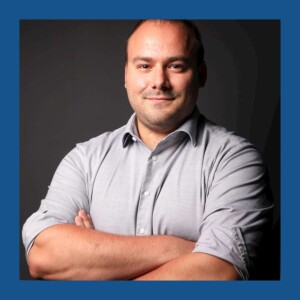
Thursday Dec 02, 2021
Thursday Dec 02, 2021
Contribue à la production de Papa PhD sur Patreon !
Ou ravitaille David en café :)
Cette semaine sur Papa PhD, je t'apporte ma récente conversation avec Raphaël Civade.
Au long de cette entrevue, dont le fil rouge est le rebond professionnel en tant que PhD sur le marché du travail, Raphaël partage son vécu et des conseils étayées sur les leçons qu'il a apprises depuis la conclusion de son doctorat.
Comme bonus, tu verras que Raphaël partage des trucs et astuces qui émanent de son expérience comme chasseur de têtes - donc sort ton bloc-notes!
Bonne écoute!
VIDÉO
https://www.youtube.com/watch?v=R2RC5AH1-Mg?sub_confirmation=1
En tant que slasheur intrapreneur et entrepreneur, les missions de Raphaël Civade interviennent à l'interface des groupes opérationnels et fonctionnels des organisations, en interne/externe et avec une dimension internationale.
Initialement scientifique-chercheur en Ecologie Moléculaire, c'est à cette période là que Raphaël s'intéresse à la structuration de l'innovation, à la conception de produits et aux stratégies des développements individuels et collectifs.
Ce sont les diverses expériences en tant que chasseur de têtes, qui lui font prendre conscience des enjeux individuels et collectifs au sein des organisations. Cette phase d'observations lui a permis à la fois d'être en contact avec une très grande variété de communautés et d'avancer sur une introspection professionnelle.
Foncièrement orienté collectif, Raphaël participe activement au sein de la communauté des Docteurs en Sciences (PhD) pour la valorisation de ces profils au sein de la société professionnelle française.
Ce que tu apprendras dans cet épisode :
Le trajet de Raphaël de la recherche en écologie moléculaire à son rôle actuel en sciences sociales
Comment rebondirg (graduellement) après le faillite de son employeur
Les mécanismes et la temporalité du procès de recrutement
Les codes à connaître avant de passer en entrevue
Le rôle de coach que peut jouer un recruteur/manager dans un processus de recherche d'emploi
Comment votre formation doctorale peut vous aider dans votre recherche d'emploi
Le facteur « PhD » - un obstacle pendant le recrutement / un atout en entreprise
Les ressources de cet épisode :
Raphaël Civade | LinkedIn
Merci Raphaël !
Si cet entretien avec Raphaël Civade t'a plu, fais-lui en part en cliquant sur les liens ci-dessous et en nous laissant un message :
Clique ici pour remercier Raphaël sur LinkedIn !
Clique ici pour partager avec David le principal message que tu retiens de cet épisode !
Télécharge la "Boîte à outils pour le doctorat" maintenant !
Nouveauté - Sponsors
J'ai créé sur le site web une nouvelle page où je partagerai avec toi les ressources que j'utilise et que je recommande en tant que producteur et animateur de Papa PhD.
Je considère ces ressources et ces services des sponsors de Papa PhD et j'ai préparé avec eux des offres exclusives pour tous les auditeurs du podcast.
Clique sur le bouton ci-dessous et rends-leur visite!
Visite les sponsors de Papa PhD !
Tu aimeras aussi ces épisodes :
Emilie L. Dubois – Marier art, science et entrepreneuriat : PapaPhD.com/120
Ilhame Ameqrane – Être docteur.e en entreprise : PapaPhD.com/125
Jennifer Saniossian – La recherche action en sciences de gestion : PapaPhD.com/131
Luc Lapointe – Le courtage de connaissances en gestion : PapaPhD.com/135
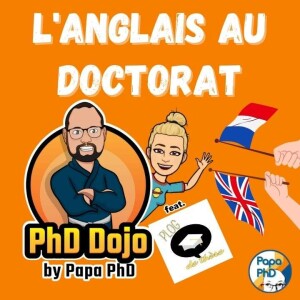
Monday Nov 29, 2021
Monday Nov 29, 2021
Contribue à la production de Papa PhD sur Patreon !
Ou ravitaille David en café :)
Bienvenue à l'épisode 4 du PhD Dojo en français, avec Sarah Perrier, du podcast Plog de thèse.
VIDÉO
https://www.youtube.com/watch?v=A9vdvcxtKnEJ'ai toujours eu la chance d'avoir de la facilité avec les langues. Donc quand je suis au doctorat, les présentations, les journal clubs, les rencontres avec des chercheurs d'ailleurs dans le monde ne m'ont posé aucun problème. Une chance, un privilège, tu peux te dire... Mais est-ce que c'est une nécessité ?Aujourd'hui sur PhD Dojo, je discute avec Sarah de l'importance de la maîtrise de l'anglais – à l'écrit, mais aussi à l'orale – au doctorat et en recherche, et on partage avec toi nos tips and tricks pour s'y mettre et pour s'améliorer.Si tu veux m'aider dans le sous-titrage d'un épisode de Papa PhD ou du PhD Dojo, écris-moi à david@papaphd.com et parlons-en!Bonne écoute ! Et bons partages !
Les ressources de cet épisode :
David Mendes | LinkedInDavid Mendes | InstagramSarah Perrier | LinkedInSarah Perrier | InstagramPlog de Thèse | Podcast
Au plaisir de se retrouver entre tes deux oreilles !
Si cet épisode t'a plu, fais-nous en part en cliquant sur les liens ci-dessous et en nous laissant un message :Clique ici pour remercier Sarah Perrier sur Twitter !Clique ici pour partager avec David le principal message que tu retiens de cet épisode !
Nouveauté - Sponsors
J'ai créé sur le site web une nouvelle page où je partagerai avec toi les ressources que j'utilise et que je recommande en tant que producteur et animateur de Papa PhD.Je considère ces ressources et ces services des sponsors de Papa PhD et j'ai préparé avec eux des offres exclusives pour tous les auditeurs du podcast.Clique sur le bouton ci-dessous et rends-leur visite!
Visite les sponsors de Papa PhD !
Tu aimeras aussi ces épisodes :
Présentation de PhD Dojo : PapaPhD.com/128Quels chemins mènent doctorat : PapaPhD.com/132Spécial Halloween - : PapaPhD.com/136Zotero vs Mendeley - : PapaPhD.com/138
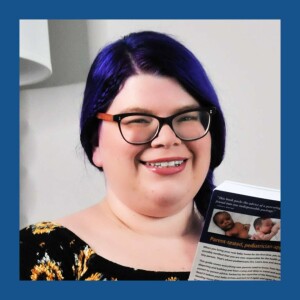
Thursday Nov 25, 2021
Thursday Nov 25, 2021
Get the Papa PhD Career Readiness Tool kit !
University policies... Are they set in stone? Do we get to update them, if they're unfair or archaic? If you're considering this type of question, today, you might be feeling like David facing Goliath, and tend to shrug your shoulders and just accept things as they are.This week, I'm sharing my conversation with Marie McCausland, where she lays out the roadmap of how she led a community effort that led to an increase in parental leave for postdocs at her university.
VIDEO
https://youtu.be/d83KUy73p44?sub_confirmation=1Marie McCausland is a scientist, doula, and maternal health advocate and is the founder of the Non Profit Mom Effect and DigiDoula App.She survived a near-death experience with Post-Partum Pre Eclampsia in 2017 following the birth of her son, an experience which put her life and work into perspective and changed her career trajectory entirely.Marie has shared her experience through her TedX talk in 2019, at the March for Moms in 2017 and 2019, and in dozens of talks across the US aimed at increasing awareness and promoting change.Marie has a PhD in Molecular Virology from CWRU, a Masters in Public Health from Kent State, is a CAPPA trained Postpartum Doula, and is currently working on her MBA. She has one amazing son, Jeffrey, with her dedicated husband Jeffrey McCausland.
What you’ll learn about in this episode:
How to gather a community around a common goal, among different university employee groupsWhat a postdoc representative at the university senate can doHow to start the conversation with university deciders by starting with faculty and gradually moving up the decision ladderThe power of using reference institutions as goal-setting examples for university decidersThe weight networking has in the process of getting into industryHow to access the public health spaceThe importance of advocating for yourself
Thank you, Alana Rister!
If you enjoyed this conversation with Marie, let her know by clicking the link below and leaving her a message on Twitter:Send Marie McCausland a thank you message on Twitter!Click here to share your key take-away from this interview with David!
This episode’s resources:
Marie McCausland | TwitterMarie McCausland | LinkedInMarie's TEDx talk | VideoMom Effect | FacebookDigi Doula | WebsitePitch Club | LinkedInKent State Online Masters in Public Health | Website
You might also like the following episodes:
David Giltner – Reconciling the Research and the Development MindsetKrishna Kadiyala – Are things changing for the better for women in STEM?Alana Rister – Marketing Your Research Skills After Your PhDNatalia Bielczyk – Figuring Out Where You Fit in the Job Market as a PhDAs always, if you find value in Papa PhD and in the content I bring you every week, click on one of the buttons below and send some of that value back to me by becoming a supporter on Patreon or by buying me a coffee :) Now with the added perk of receiving the brand new Papa PhD and PhD Dojo stickers!
Support the show on Patreon !
Or buy me a coffee :)
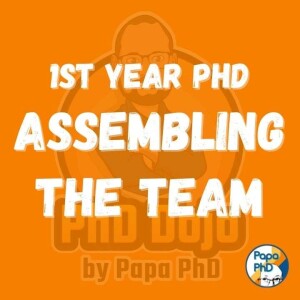
Monday Nov 22, 2021
Monday Nov 22, 2021
Welcome to the PhD Dojo!
This week, I'm bringing you part three of the PhD Dojo series on tools and strategies to make the best out of your PhD experience. Today – Assembling the PhD Expedition Team, or how to ensure your PhD won't be a solitary endeavor and that you will have help and resources when you need them.
Below, you'll find the full – edited to be read – transcript of the live taping of this episode.
VIDEO
https://youtu.be/5cgvJZilcQU?sub_confirmation=1
FULL TRANSCRIPT
[00:00:00] Welcome to this new episode of the PhD Dojo by Papa PhD. Today's episode is called "Assemble the Expedition Team". It's part two of the series about advice for first year or early PhD students. Last episode, I talked about what you should prepare to start this endeavor, to start this adventure.[00:00:27] And this week is going to be the follow-up, let's say. Because your PhD, yes, it's going to be your personal contribution to your area of research and to your domain, but it's not supposed to be a solitary endeavor. Ideally, besides finding a lab, finding a supervisor, you should try also to find the following people to be part of what I consider to be the team or almost the village that makes a healthy PhD experience.[00:01:06] And the first other element or team mate let's say would be an external mentor or a committee, someone or a group of people who can bring a fresh outlook on your research and on your progression. without the pressure of being your supervisor – the supervisor PhD student has a lot of pressure on it, the relationship, and this is why my advice is to, if you can, if you're able, if there's someone around you that could fill that, that position to find someone who can in an unbiased way, in that sense, be a mentor for you, be someone who you can turn to with all your questions, all your difficulties that are not specifically to do with the details of your research, but to do with your experience as a graduate student at large, with your your life plan, for example, with how your PhD is fitting with your values and with how you project yourself professionally into the future. So, mentorship, or at least, you know, having, having an impartial, let's say committee that regularly can go to.[00:02:31] The second element that I think can be really, really a plus for you during your PhD are what I call research mentors. These would be post-docs, senior researchers, people who are finishing their PhD and who know the ropes and who you can resort to in your day to day to help you just move your project along.[00:02:58] When you start, there's a lot of unknown, there's a lot of of doubt, there's a lot of searching, and if you have people around you in your team, in your lab or in labs around you, that can help you not be let's say digging to find something that they have already found, well, establishing a relationship with these people and having them be part of your team, it's also going to help you a lot. Because, you know, PIs, very often, they're super busy. They, they can't answer your every question and they can't be available all the time. But people around you, people who are at a different stage of the graduate studies journey, they can help you, they, I'm thinking of the life sciences, which is where I was, but they use the different equipment, they do the different techniques, they have tricks, you know, they have advice they can give you. So don't, don't forget that they can be a resource for you. And also this is a give and take – I'm always saying this thinking of you as part of a community where there's, there's give and take, but as someone who's beginning, well, you need more help. This is why I'm I'm I'm suggesting this. So – research mentors. [00:04:27] The third element or teammate, let's say, I would say are peers, peers with whom you can discuss your research, share your questions, work on on student community projects. So, people who are going through the same experiences that you're go...
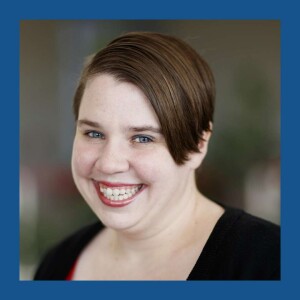
Thursday Nov 18, 2021
Thursday Nov 18, 2021
Get the Papa PhD Career Readiness Tool kit !
Building your brand? Improving your discoverability? Establishing a presence on social media? These are questions that are seldom covered in the context of graduate school and of the career development of young researchers.Do these questions pique your interest?This week, I'm bringing you my recent conversation with Alana Rister about how to market your skills after the PhD.
VIDEO
https://www.youtube.com/watch?v=sAwdQU4HK00?sub_confirmation=1Alana Rister earned her Ph.D. in Chemistry in 2019. Since then, she has been a postdoctoral scholar and research specialist.However, throughout Alana’s experiences, she realized that many researchers were stressed because they didn't have support and felt overwhelmed in their research, so she created the Science Grad School Coach to help support researchers and help them learn exactly how to complete their research with more confidence and less effort.
What you’ll learn about in this episode:
Why you should work on your brand and on marketing yourself starting in graduate schoolHow to increase your findability, your discoverability as a young researcherHow building a presence on social media can help your research and your careerProtecting unpublished data when building your online presenceThe importance of tailoring your communications to each specific audience in a talk setting or in a job interview settingThe importance of being authentic in all your communications and interactionsWhat brought Alana to create Science Grad School Coach and how she helps graduate students make the best out of their PhD
Thank you, Alana Rister!
If you enjoyed this conversation with ALana, let her know by clicking the link below and leaving her a message on Twitter:Send Alana Rister a thank you message on Twitter!Click here to share your key take-away from this interview with David!
This episode’s resources:
Alana Rister | TwitterAlana Rister | LinkedInScience Grad School Coach | Website
You might also like the following episodes:
David Giltner – Reconciling the Research and the Development MindsetKrishna Kadiyala – Are things changing for the better for women in STEM?Emily Roberts – Setting yourself up for a healthy financial lifeNatalia Bielczyk – Figuring Out Where You Fit in the Job Market as a PhDAs always, if you find value in Papa PhD and in the content I bring you every week, click on one of the buttons below and send some of that value back to me by becoming a supporter on Patreon or by buying me a coffee :) Now with the added perk of receiving the brand new Papa PhD and PhD Dojo stickers!
Support the show on Patreon !
Or buy me a coffee :)
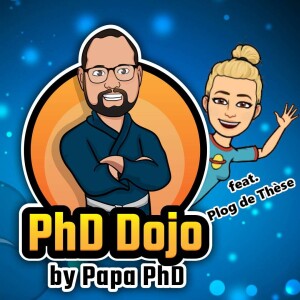
Monday Nov 15, 2021
Monday Nov 15, 2021
Contribue à la production de Papa PhD sur Patreon !
Ou ravitaille David en café :)
Bienvenue à l'épisode 3 du PhD Dojo en français, avec Sarah Perrier, du podcast Plog de thèse.
VIDÉO
https://youtu.be/Tr_45iw62Hg
Pendant mon doctorat, j'ai découvert et utilisé Mendeley pour gérer mes références.
Dans ce nouvel épisode de PhD Dojo, Sarah et moi allons parler de Zotero, de comment elle l'utilise, et nous allons partager avec toi des conseils et un « tip » qui t'aidera à optimiser l'utilisation de ce type de logiciel (pas juste Zotero) dans la gestion des références pour ta thèse.
Si tu veux participer à ces conversations, envoie-nous tes questions sur Patreon ou sur les réseaux sociaux (@plogdethese ou @papaphdpodcast) et assiste en direct à l'enregistrement des épisodes, tous les quinze jours, le jeudi à 12h30, heure de Montréal, 18h30, heure de France.
Bonne écoute ! Et bons partages !
Les ressources de cet épisode :
David Mendes | LinkedIn
David Mendes | Instagram
Sarah Perrier | LinkedIn
Sarah Perrier | Instagram
Plog de Thèse | Podcast
Au plaisir de se retrouver entre tes deux oreilles !
Si cet épisode t'a plu, fais-nous en part en cliquant sur les liens ci-dessous et en nous laissant un message :
Clique ici pour remercier Sarah Perrier sur Twitter !
Clique ici pour partager avec David le principal message que tu retiens de cet épisode !
Nouveauté - Sponsors
J'ai créé sur le site web une nouvelle page où je partagerai avec toi les ressources que j'utilise et que je recommande en tant que producteur et animateur de Papa PhD.
Je considère ces ressources et ces services des sponsors de Papa PhD et j'ai préparé avec eux des offres exclusives pour tous les auditeurs du podcast.
Clique sur le bouton ci-dessous et rends-leur visite!
Visite les sponsors de Papa PhD !
Tu aimeras aussi ces épisodes :
Présentation de PhD Dojo : PapaPhD.com/128
Quels chemins mènent doctorat : PapaPhD.com/132
Spécial Halloween - : PapaPhD.com/136

Thursday Nov 11, 2021
Thursday Nov 11, 2021
Contribue à la production de Papa PhD sur Patreon !
Ou ravitaille David en café :)
Cette semaine sur Papa PhD, je t'apporte ma récente conversation avec Nicolas Stifani, coordonnateur de la plateforme de miscroscopie de l'Université de Montréal.
Nicolas et moi nous sommes croisés au doctorat, à l'Institut Neurologique de Montréal. Dans cette conversation j'apprends ce qui a suivi le doctorat, pour Nicolas, un passage par l'industrie, un trajet postdoctoral, un période de travail en construction et, finalement, son poste actuel . À travers tout ça, nous avons parlé de santé mentale et des défis que celle-ci peut nous apporter pendant le doctorat et au cours de notre parcours de jeune chercheur.
VIDÉO
https://youtu.be/HeGLO4KO8xU?sub_confirmation=1
Après un master en biochimie à l'université de Nice, Nicolas a obtenu son doctorat sur la diversité génétique des neurones moteurs de la moelle épinière à l'université McGill, à Montréal.
Après un trajet postdoctoral qui l'a mené de l'université McGill à l'université Dalhousie et finalement à l'Institut de Recherche Clinique de Montréal, Nicolas a intégré l'université de Montréal, où il travaille aujourd'hui en contact étroit avec les chercheurs.
Comment est-il passé de responsable marketing pour une compagnie cosmétique, à sans-emploi, à ouvrier dans la construction, à responsable de la microscopie? Il nous le raconte dans ce nouvel épisode de Papa PhD!
Ce que tu apprendras dans cet épisode :
Le trajet universitaire de Nicolas, en partant d'un master professionalisant
Quand est-ce qu'on peut mettre en pause son doctorat
Ce que son passage en entreprise lui a appris sur la culture de travail au privé
L'importance de prendre le temps (et même faire une pause) pour s'occuper de sa santé mentale et d'aller chercher de l'aide
L'importance des compétences « douces » en tant que candidat au postdoctorat
Pourquoi il ne faut pas hésiter à frapper aux portes pour demander da l'aide
Les ressources de cet épisode :
Nicolas Stifani | LinkedIn
Nicolas Stifani | Courriel
Merci Nicolas !
Si cet entretien avec Nicolas Stifani t'a plu, fais-lui en part en cliquant sur les liens ci-dessous et en nous laissant un message :
Clique ici pour remercier Nicolas sur LinkedIn !
Clique ici pour partager avec David le principal message que tu retiens de cet épisode !
Télécharge la "Boîte à outils pour le doctorat" maintenant !
Nouveauté - Sponsors
J'ai créé sur le site web une nouvelle page où je partagerai avec toi les ressources que j'utilise et que je recommande en tant que producteur et animateur de Papa PhD.
Je considère ces ressources et ces services des sponsors de Papa PhD et j'ai préparé avec eux des offres exclusives pour tous les auditeurs du podcast.
Clique sur le bouton ci-dessous et rends-leur visite!
Visite les sponsors de Papa PhD !
Tu aimeras aussi ces épisodes :
Emilie L. Dubois – Marier art, science et entrepreneuriat : PapaPhD.com/120
Ilhame Ameqrane – Être docteur.e en entreprise : PapaPhD.com/125
Jennifer Saniossian – La recherche action en sciences de gestion : PapaPhD.com/131
Luc Lapointe – Le courtage de connaissances en gestion : PapaPhD.com/135
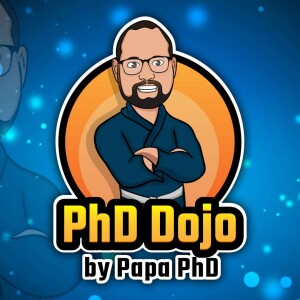
Monday Nov 08, 2021
Monday Nov 08, 2021
Welcome to the PhD Dojo!This week, I'm starting a series on tools and strategies to make the best out of your PhD experience. Today – Things I would have loved to know when I started my PhD and that would have saved me a lot of headaches.Below, you'll find the full, edited to be read, transcript of the live taping of this episode.
VIDEO
https://www.youtube.com/watch?v=h24keeOwgRE?sub_confirmation=1
FULL TRANSCRIPT
[00:00:00] Today's episode is: "First Year PhD – Avoiding the Pitfalls".[00:00:05] In a space mission, there is one countdown, one launch, one destination, and no place for error or that. Grad studies are less like a rocket launch and more like an expedition into uncharted territories. As such graduate studies are a forgiving endeavor where you have ample opportunity to reassess and reorient along the way. So what I'm seeing is, as a PhD student, you are an external. And what's the first thing that an Explorer does when setting up for an expedition today, what they do is that they plan, they trace a plan for their expedition.[00:00:56] And this is the tip that I'm going to share today. Tracing a plan for your PhD is a very important strategy from the outset, to help you have the best experience, at least for that first year where you're going to be in a new environment, you're going to meet new people. You're going to be learning a new culture, depending on the, the lab you're you're in or the country you're moving to. So having some sort of a plan is going to help you in the long term. So my first piece of advice there is: spend enough time at the beginning because you can fall into the trap of hitting the ground running and starting whatever experiments or projects that are proposed to you without sitting down and planning.[00:01:52] What I'm asking you to do is to, to take all of that in, and then create a plan. And be as granular as possible. Write short, medium and long-term goals for yourself. One of the things that I know I didn't do at the beginning of my PhD was to – first, put this down on paper and second, the long-term plans and, or long-term objectives or goals, I didn't think of them. Why they are important is because they are going kind of to dictate the other decisions that you're going to make along the way, versus if you don't plan ahead, you can fall into different rabbit holes, lose time. And we all know that time is finite, funding is finite, and so, why the planning is important is because of all of these reasons. You need to optimize the time that you're going to spend during your PhD and some, some places it's three years and there, the time constraint is even, it's even more critical, let's say. Some, some places like here, here in Canada, for example, you can go to six years or even more, depending, and depending also on the domain you are, you are.[00:03:10] But besides the time there's the money issue. So, if you're able to spend that first week, those first two weeks planning, setting goals, sitting with your supervisor and having them help you set goals, such as when, when an article could be published a book chapter, things like that, that is going to help you immensely. Of course, when you're going to sit down and write down that first plan, it's going to be the ideal. You're going to learn and people who've gone through the process, know that things don't go. Ideally there's snacks. There's a, there's a different obstacles that you hit. There's a hypothesis that simply don't work and. The next thing after having a plan is backup plans. You need to have backup plans and nice suggest even if possible, because you might, and this is what happened to me.[00:04:20] You might be attracted to from the outset to a higher risk, maybe higher gain, but higher risk project, but it's high risk. And you want to have a lower risk projects, lower hanging fruit that you can fall back on, if there's a problem with that project, which happens to a lot of us and we're first year PhD ...
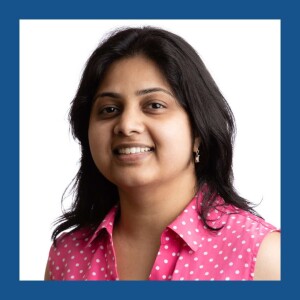
Thursday Nov 04, 2021
Thursday Nov 04, 2021
Get the Papa PhD Career Readiness Tool kit !
On this episode, I will be bringing you my interview with Krishna Kadiyala. During our conversation, we talked about Krishna's experience as a woman in the STEM space, and in particular about her decision to have children during the PhD. An important conversation I really wanted to bring you, as the subject is seldom covered, but affects so many young researchers.
VIDEO
https://www.youtube.com/watch?v=FISR2nefAdo?sub_confirmation=1
Krishna Kadiyala is an Assistant Professor of Computer Science at Texas Christian University. Prior to starting her PhD journey, she was Senior Network Engineer at AT&T Labs in Middletown, NJ for 3 years.
During Krishna’s PhD candidature, she’s also mothered two beautiful girls. She is passionate about learning, teaching and helping girls in Computer Science, and is an advocate for PhD moms and moms with young kids in academia.
What you’ll learn about in this episode:
The overwhelm mothers experience in research before and after COVID
How Krishna learned what her type of parenting was and how she built her schedule around it
The importance of choosing a university/research environment where your life plans will be accepted and encouraged
The importance of guaranteeing funding that will not be impacted by the decision to have children
How self-advocacy is key to getting things to change around you
Why putting your mental health first is key at any stage of your career
Thank you, Krishna Kadiyala!
If you enjoyed this conversation with Krishna, let her know by clicking the link below and leaving her a message on LinkedIn:
Send Krishna Kadiyala a thank you message on LinkedIn!
Click here to share your key take-away from this interview with David!
This episode’s resources:
Krishna Kadiyala | LinkedIn
Google I am Remarkable Program | Website
Book by Brené Brown | The Gifts of Imperfection
You might also like the following episodes:
David Giltner – Reconciling the Research and the Development Mindset
Katya Park – Staying True to Your Life Plans During the PhD
Matthias Hombauer – Being a PhD, a Father and an Entrepreneur
Natalia Bielczyk – Figuring Out Where You Fit in the Job Market as a PhD
Are you looking for in-depth career readiness training?
Well - you're in luck, because friend of the show and founder of Ontology of Value Natalia Bielczyk, PhD has created The Ontology of Value Masterclass for PhDs – an intensive 6-week online workshop that will give you a runway to a brand new career in industry.
This masterclass consists of three Sections.
In the first Section, you will learn what you need to know about your opportunities in the job market. You will go through a number of self-discovery exercises which will help you determine where you fit best.
In the second Section, you will acquire all the skills you need to search for and land good jobs.
Lastly, in the third Section, you will learn general self-navigation strategies that will make you progress fast in any working environment and quickly adjust to the changing job market.
And all this in a group of ambitious, helpful, and motivated people like you.
If you use the affiliate links on this page, Natalia has kindly offered to give Papa PhD listeners two (2) access codes to the Ontology of Value Test instead of one, so you can gift one to a friend!
Register for the next Ontology of Value Masterclass for PhDs now !
As always, if you find value in Papa PhD and in the content I bring you every week, click on one of the buttons below and send some of that value back to me by becoming a supporter on Patreon or by buying me a coffee :) Now with the added perk of receiving the brand new Papa PhD and PhD Dojo stickers!
Support the show on Patreon !
Or buy me a coffee :)
